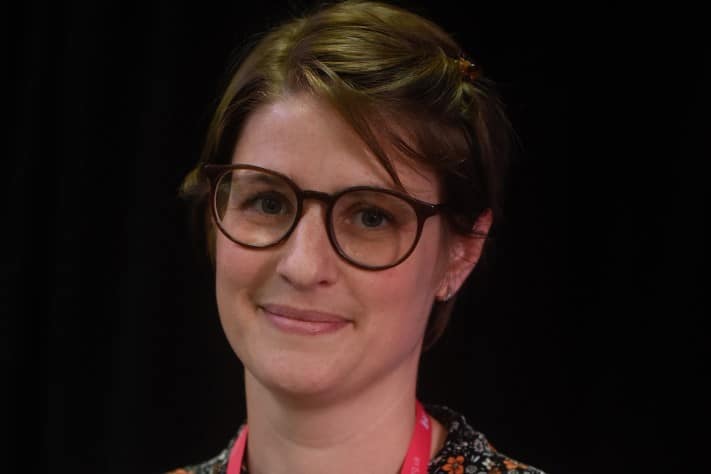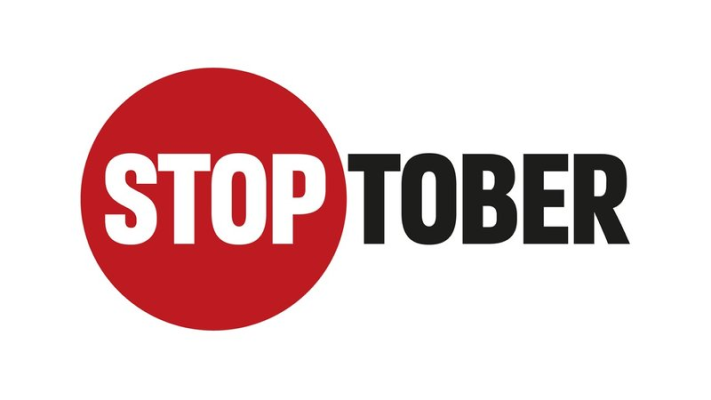23rd October 2023
During Stoptober, we are delighted to share this Voices blog by Louisa Clifford, Research Associate at the Institute of Health Visiting. Louisa shares details of the current BabyBreathe project and the importance of helping parents to stay smoke free following the birth of a baby.

Louisa Clifford, Research Associate at the Institute of Health Visiting

Stoptober is an annual, month-long campaign which encourages individuals to quit smoking during the month of October. Launched in 2013 by The Department of Health and Former Public Health England, Stoptober employs a combination of public health initiatives, support and smoking cessation aids to assist people who smoke in moving towards a smoke-free life.
Smoking remains a leading cause of preventable illness and death in the UK¹, in addition to contributing to health inequality and worsening social mobility². Reducing the number of people who smoke is therefore a key public health priority, with governments across the UK committed to reaching below 5% smoking prevalence by 2030 in England³ and Wales⁴, by 2034 in Scotland⁵, with Northern Ireland yet to set a date.
Research from University College London’s Tobacco and Alcohol Research Group indicates that around 350,000 people have quit smoking each year since Stoptober was launched⁶. The initiative is based on evidence that shows that in making it to 28 days smoke free, individuals are 5 times more likely to quit for good⁷. This year’s campaign, ‘When you stop smoking, good things start to happen’, is designed to highlight the immediate benefits that smokers can expect when they stop smoking.⁸
A recent survey suggests that nearly all (95%) of ex-smokers see positive changes in their life as early as 2 weeks after quitting.⁹ Sustained postpartum abstinence has significant, long-term health benefits for parents and children¹⁰ and reduces the intergenerational effects on children of being exposed to role models who smoke¹¹.
In the UK, around a quarter of women and pregnant people report smoking before pregnancy, around 45% of those are able to ‘spontaneously quit’ during pregnancy¹². Most people who quit smoking during pregnancy wish to remain abstinent after they give birth; however, up to three-quarters of spontaneous quitters return to smoking within 6 months¹³. Postpartum relapse is a major public health problem; yet there are no evidence-based interventions, and no routine support is offered to prevent relapse¹². The National Health Service (NHS) Long Term Plan prioritises smoking cessation services in pregnancy, overlooking postpartum support. Supporting sustained abstinence may be critical to reaching the UK government ‘smoke free 2030’ target.

The Institute of Health Visiting is a collaborator in a large randomised controlled trial study called NIHR BabyBreathe. This study aims to build on the success of smoking-cessation interventions in pregnancy, by trialling a theory-based relapse prevention intervention developed by the University of East Anglia.
BabyBreathe is an evidence-based package of support to help parents stay smoke free following the birth of a baby and is informed by the Capability Opportunity Motivation-Behaviour model (COM-B) and Behaviour Change Wheel. The trial was delivered in partnership with sites across Norfolk, London, the North East and Scotland. The package of support is offered in addition to usual care and delivered alongside existing healthcare services (health visiting). The intervention comprises antenatal and postnatal support and includes brief advice from a BabyBreathe trained practitioner, offering guidance towards alternatives to smoking and self-rewards to remain smoke free. Additional resources include leaflets for the pregnant person and their partner, electronic carbon monoxide (CO) testing, and exclusive access to the BabyBreathe website, app and online support group.
The first participant was randomised to the study in September 2021. Over 880 people have now been recruited to the study, with those allocated to the intervention group receiving BabyBreathe support. All participants will be followed up until their baby reaches 12 months of age. It is anticipated that results will be published following final follow-up in late 2024 or early 2025.
As a research health visitor working on the BabyBreathe trial, my role involves a multifaceted approach to both research and participant engagement. Through the intervention, participants are offered information and support to encourage them to remain smoke free following the birth of their baby. To maximise retention and minimise loss to follow-up we endeavour to retain contact with study participants through regular contact to offer support and, where possible, collect self-report data. The study research team is collecting both qualitative and quantitative data to assess the implementation of the intervention and mechanisms of impact.
‘Bridging the gap’ between research and clinical practice is essential in the development of evidence-based interventions to improve healthcare outcomes for families. Stoptober is one element of a broader strategy to reduce smoking rates, but the evidence suggests it plays a significant role in motivating and supporting individuals to quit smoking and maintain a smoke-free lifestyle, and smoke-free family homes. Relapse prevention is crucial in improving outcomes for children and families, reducing preventable ill health and deaths and addressing health inequalities.
The project lead, Professor Caitlin Notley, said:
“It has been a brilliant experience working with the Institute of Health Visiting. The Institute has led recruitment to the BabyBreathe study in the North East of England, and Louisa has additionally helped to deliver the BabyBreathe intervention remotely, in order that we could be as inclusive as possible in our approach, and support people across the whole of the UK. For translational research to really have a positive impact, it is essential that research engages with community-based services and evaluates interventions like Babybreathe in ‘real world’ settings. If we show through this study that BabyBreathe is effective at supporting postpartum people to remain smoke free and prevent relapse, we will work together with the iHV to promote the approach and its implementation as part of routine usual care.”
Louisa Clifford, Research Associate, Institute of Health Visiting
References
- Adult Smoking Habits in the UK – Office for National Statistics [Internet]. www.ons.gov.uk. Office for National Statistics; 2020.
- Action on Smoking. Smoking-and-health-inequalities. 2022.
- Department of Health and Social Care. Stopping the start: our new plan to create a smokefree generation. 2023.
- Welsh Government. Towards a Smoke-Free Wales. Tobacco Control Delivery Plan 2022-2024. 2021.
- The Scottish Government. Raising Scotland’s tobacco-free generation: our tobacco control action plan 2018. 2018.
- University College London. UCL research informs “Stoptober” helping thousands to quit smoking. Research Impact. 2022.
- NHS. Better Health. Quit smoking this Stoptober. 2023.
- Better Health –Stoptober 2023 – Campaign Toolkit. 2023.
- Survey conducted by Censuswide, reaching 3000 Adults in England between 23.08.2023 – 31.08.2023. Censuswide abides by and employs members of the Market Research Society which is based on the ESOMAR principles.
- Pirie, K.; Peto, R.; Reeves, G.K.; Green, J.; Beral, V. The 21st century hazards of smoking and benefits of stopping: A prospective study of one million women in the UK. Lancet 2013, 381, 133–141.
- Leonardi-Bee J, Jere ML, Britton J. Exposure to parental and sibling smoking and the risk of smoking uptake in childhood and adolescence: a systematic review and meta-analysis. Thorax. 2011; 66(10): pp. 847–55.
- Notley C, Brown TJ, Bauld L, et al BabyBreathe trial: protocol for a randomised controlled trial of a complex intervention to prevent postpartum return to smoking BMJ Open 2023;13:doi: 10.1136/bmjopen-2023-076458
- Jones M, Lewis S, Parrott S, Wormall S and Coleman T. Re-starting smoking in the postpartum period after receiving a smoking cessation intervention: a systematic review. Addiction. 2016; 111(6): pp 981–90.






